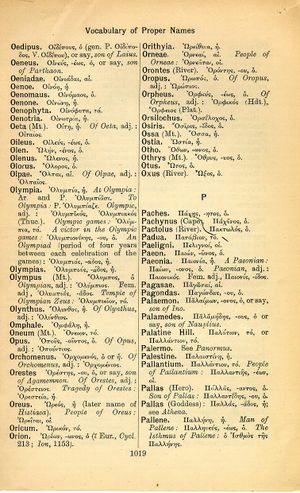Olympus
Ὥσπερ αὐτοῦ τοῦ ἡλίου μὴ ὄντος καυστικοῦ, ἀλλ' οὔσης ζωτικῆς καὶ ζωοποιοῦ θέρμης ἐν αὐτῷ καὶ ἀπλήκτου, ὁ ἀὴρ παθητικῶς δέχεται τὸ ἀπ' αὐτοῦ ϕῶς καὶ καυστικῶς· οὕτως οὖν ἁρμονίας οὔσης ἐν αὐτοῖς τινὸς καὶ ἑτέρου εἴδους ϕωνῆς ἡμεῖς παθητικῶς ἀκούομεν → Just as although the Sun itself does not cause burning but has a heat in it that is life-giving, life-engendering, and mild, the air receives light from it by being affected and burned, so also although there is a certain harmony and a different kind of voice in them, we hear it by being affected.
English > Greek (Woodhouse)
(Mt.) Ὄλυμπος, ὁ
Olympian, adj.: Ὀλύμπιος. Fem. adj., Ὀλυμπιάς, -άδος.
Temple of Olympian Zeus: Ὀλυμπιεῖον, τό.
Latin > English (Lewis & Short)
Ŏlympus: 1, m.,
I a famous fluteplayer, pupil of Marsyas, Ov. M. 6, 393; id. P. 3, 3, 42; Hyg. Fab. 165; Plin. 36, 5, 4, § 29.
Ŏlympus: and -pos (anciently written Olĭmpus), i, m., = Ὄλυμπος.
I The name of several mountains, the most celebrated of which is one on the borders of Macedonia and Thessaly (now Lacha), of great height, and consequently regarded as the seat of the gods, Mel. 2, 3, 2; 4, 8, 15: Musae quae pedibus magnum pulsatis Olimpum, Enn. ap. Varr. L. L. 7, § 20 Müll.: his diis Helicona atque Olympon attribuerunt homines, Varr. R. R. 3, 16, 7: frondosus, Verg. G. 1, 282: opacus, Hor. C. 3, 4, 52: nubes excedit Olympus, Luc. 2, 271.—
B Transf., poet. for heaven: caelum dicunt Graeci Olympum, Varr. L. L. 7, § 20; Verg. E. 6, 86: longus Olympus, the distant heavens, id. G. 3, 223: annuit (Juppiter) et totum nutu tremefecit Olympum, id. A. 9, 106: stelliger, Sen. Herc. Oet. 1907.—Hence, Ŏlympĭădes, um, f., the Muses (perh. only acc. to the foll. remark): caelum dicunt Graeci Olympum montem in Macedoniā omnes, a quo potius puto Musas dictas Olympiadas, Varr. L. L. 7, § 20.—
II Of other mountains.
A In Bithynia, Plin. 5, 32, 43, § 148.—
B In Mysia, Plin. 5, 32, 40, § 142.—
C In Galatia, Liv. 38, 18, 15; 38, 20, 2.—
D In Lycia, Plin. 21, 6, 17, § 31. —
E In Ionia, Plin. 5, 29, 31, § 118.—
F In Peloponnesus, Serv. ad Verg. A. 8, 352.
Ŏlympus: i, f.,
I a city in Cilicia, named from a neighboring mountain, now the ruins of Deliktash: Olympum cepit, urbem antiquam et omnibus rebus auctam, Cic. Verr. 2, 1, 21, § 56 (Zumpt N. cr.); Flor. 3, 6, 5; Eutr. 6, 3.—
II A city of Lycia, named from a neighboring mountain, Cic. Ac. 1, 21, 56.
Latin > French (Gaffiot 2016)
(1) Ŏlympus,¹⁰ ī, m. (Ὄλυμπος),
1 Olympe [montagne entre la Thessalie et la Macédoine ; séjour des dieux] : Varro L. 7, 20 ; Virg. G. 1, 282 || [fig.] le ciel : Virg. En. 9, 106
2 montagnes de Bithynie, de Lycie, d’Ionie, de Mysie, de Galatie : Plin. 5, 148 ; 21, 31 ; 5, 118 ; 5, 142 ; Liv. 38, 18
3 f., ville maritime de Pamphylie : Cic. Verr. 2, 1, 58.
(2) Ŏlympus, ī, m., célèbre joueur de flûte, élève de Marsyas : Ov. M. 6, 393 ; Plin. 36, 35.

